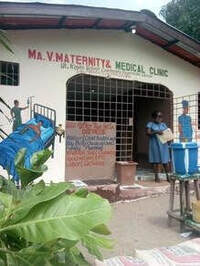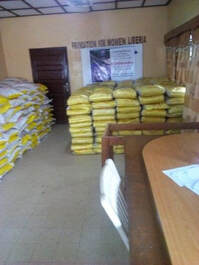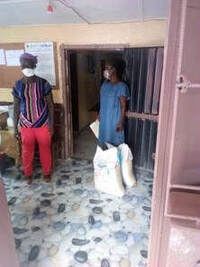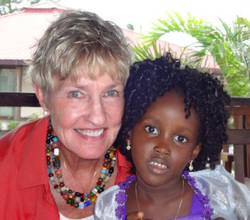
As the COVID-19 pandemic continues to affect every corner of the global economy, the impact of the virus on weak health systems and economies is only beginning to be foreshadowed. Countries with comparatively strong health systems have been catastrophically challenged by the pandemic, and as the virus spreads to poor countries, concern about the looming health crisis grows. In Liberia, where over 3 million people live below the poverty line, 97% of households do not have clean water or soap and access to personal protective measures and behaviors (such as masks, cleaning supplies, and social distancing) is almost impossible. The country sinks deeper into a compounding cycle of poverty and ill-health with the increasing number of COVID-19 cases. The healthcare system is woefully ill-prepared to manage a spike in critical cases. The country only has 6 ventilators.

Foundation for Women’s Food Security Program
Founded in 1997 by activist, entrepreneur, and social justice advocate Deborah Lindholm, the Foundation for Women (FFW) was conceived as a project to empower women – in the U.S. and abroad – through economic empowerment and financial independence. Inspired by the success of the Grameen Bank model of microfinance, Deborah had seen first-hand in communities all over the globe what the early microfinance research was showing: investing in women was the fastest, most powerful and most reliable way to invest in sustainable development.
After 15 years of extraordinary, life-changing work reaching over 1,000,000 women in the US, Africa and Asia, the Foundation for Women (FFW) scaled back the breadth of the program to focus on depth of impact in one of the most urgent, important places in the world today: Liberia. In partnership with the World Bank, Edify, Benson Hospital, Habitat for Humanity and Rotary among others, FFW is perfecting a model of service that can be duplicated elsewhere.
Using the FFW Network of Excellence and by leveraging relationships in more than 250 communities throughout the country, FFW is assisting people with the most immediate need now– food. A food security campaign was launched in May 2020. To date we have been able to assist more than 650 families and many health clinics in our Network of Excellence. While the Foundation for Women are working on larger grants, they are asking individual donors for $25. Why $25? A $25 donation feeds a family of up to 10 people for a month. With just $300, FFW can help feed a family of up to 10 people for a full year!

After decades of civil war, Liberia has struggled to recover from the impact of economic instability, corruption, and social upheaval. FFW first entered Liberia with microfinance programming in 2006 and has grown the program from 100 micro-loans in its first year, to over 50,000 investments in the past decade. While the Ebola epidemic of 2014-2015 was a devastating set-back for Liberia’s growth, the nation is re-emerging and integrated development strategies are being embraced as the path forward in Liberia to build a strong and resilient private sector.
FFW is leveraging decades of experience in microfinance to transform the services that most powerfully impact the daily lives of Liberian families: education and healthcare. Education: As the operating partner of Edify in Liberia, FFW has made 330 loans valued at over $1,200,000 to low-fee independent schools. This model has impacted over 180,000 students by enhancing school capacity and helping to make schools more financially accessible for poor families.
Healthcare: In 2018, FFW sought to transfer the learnings and success from the school program to transform the healthcare sector. In partnership with Benson Hospital, FFW launched the ‘Network of Excellence’, a lending program for health clinics to provide both access to capital and support for quality improvement. Clinics apply to FFW for loan capital and technical assistance for quality improvement and, over the course of the loan, increase access to care for vulnerable patients, building their health businesses into strong, sustainable entities that serve Liberian communities and families.
Liberia’s healthcare system has been ravaged by decades of war and economic fragility. Significant investments were made to strengthen the health system in the post-war years by foreign aid partners, but systemic improvements were slow and any gains made were largely undone by the EVD (Ebola virus disease) outbreak that struck the country in 2014-2015, killing nearly 5,000 people, 200 of whom were health workers, and depleting the already fragile health system. In a country of over 5 million people, with over 80% living below the poverty line of less than $1.25/ day, very few have access to reliable, high-quality health services.
Liberian health indicators are among the lowest in the world, the healthcare workforce is dangerously under-resourced, the supply chain to all public facilities is erratic and poorly functioning, and the over-arching health policy environment has failed to lay out a realistic, financially solvent strategy to reach the population with the health services they need. A recent report on the macro-level health services environment deemed the government’s free-care-for-all policy “unsustainable and impractical.” Even when consumers visit a public health facility, they will most often have to purchase medicines and diagnostics in the private sector because the public supply chain is so deficient.
But the private for-profit health sector is poorly regulated, under-resourced, and erratically supervised. The Ministry of Health and foreign aid actors focus money and attention on public clinics, while the majority of the population seeks care in the private sector. Hundreds of privately-owned health clinics are operating across Monrovia, Liberia’s capital city, but without a credentialing system or any enforcement mechanisms by the government, these clinics do not have uniform standards for quality assurance or patient safety. Clinic entrepreneurs are eager to grow their businesses by offering high-quality services and earning consumer trust. But presently, there are no formal structures to help nurture a vibrant private health sector and its necessary coordination with the Ministry of Health. Entrepreneurs have nowhere to turn for capacity building support; and economically vulnerable patients have no way of determining which clinics offer safe, quality-assured care.
How Can You and Your Rotary Club Support Food Security?
Is your club interested in learning more about community development projects and food security in particular? Deborah Lindholm, CEO of Foundation for Women and Past Board Member of the Rotarian Action Group for Microcredit & Dr. Angela Benson, Board Member for Foundation for Women and Current Board Member of the Rotarian Action Group for Malaria Prevention have been joining virtual Rotary Meetings to share updates on the Food Security Project with Rotary Clubs. It’s a great opportunity to learn more about Liberia and about how your club can support food security.


 RSS Feed
RSS Feed